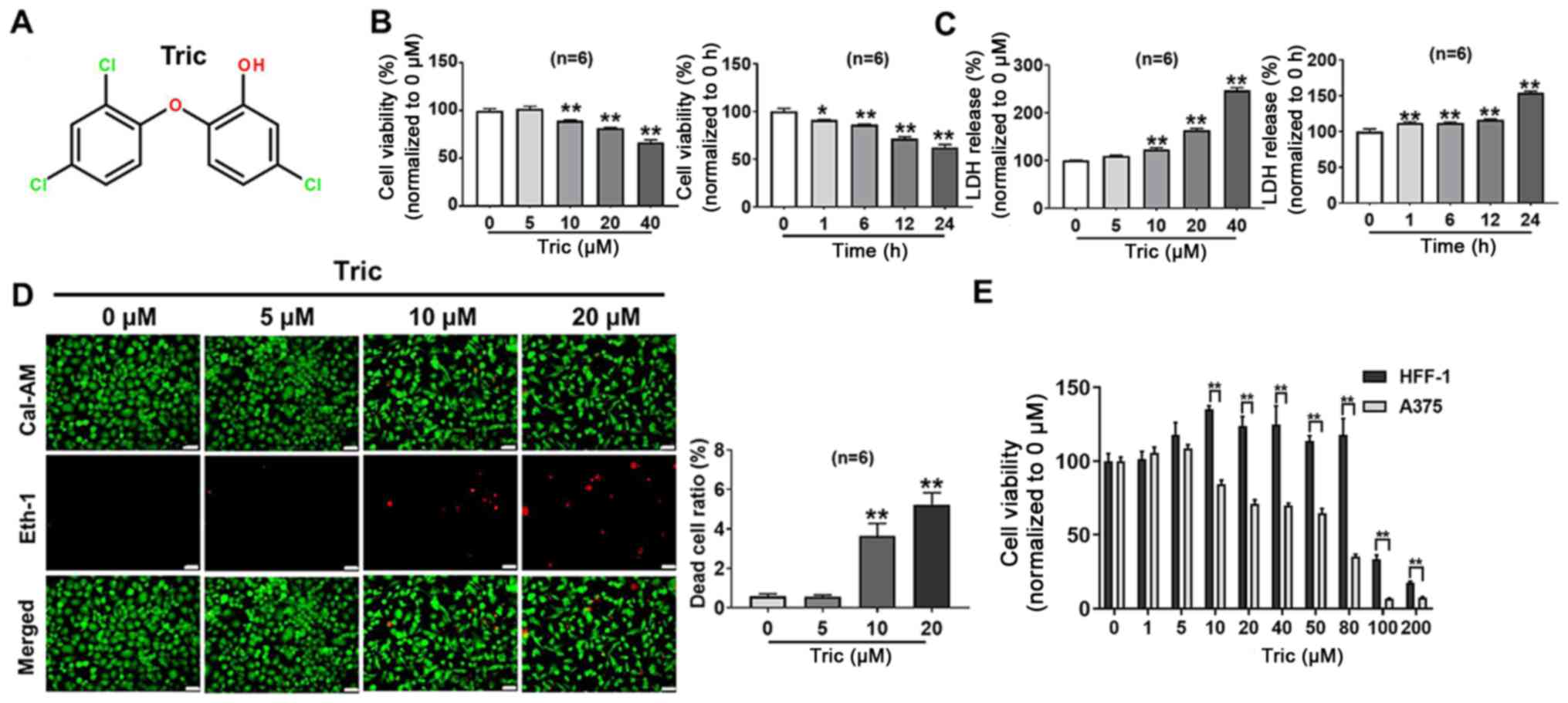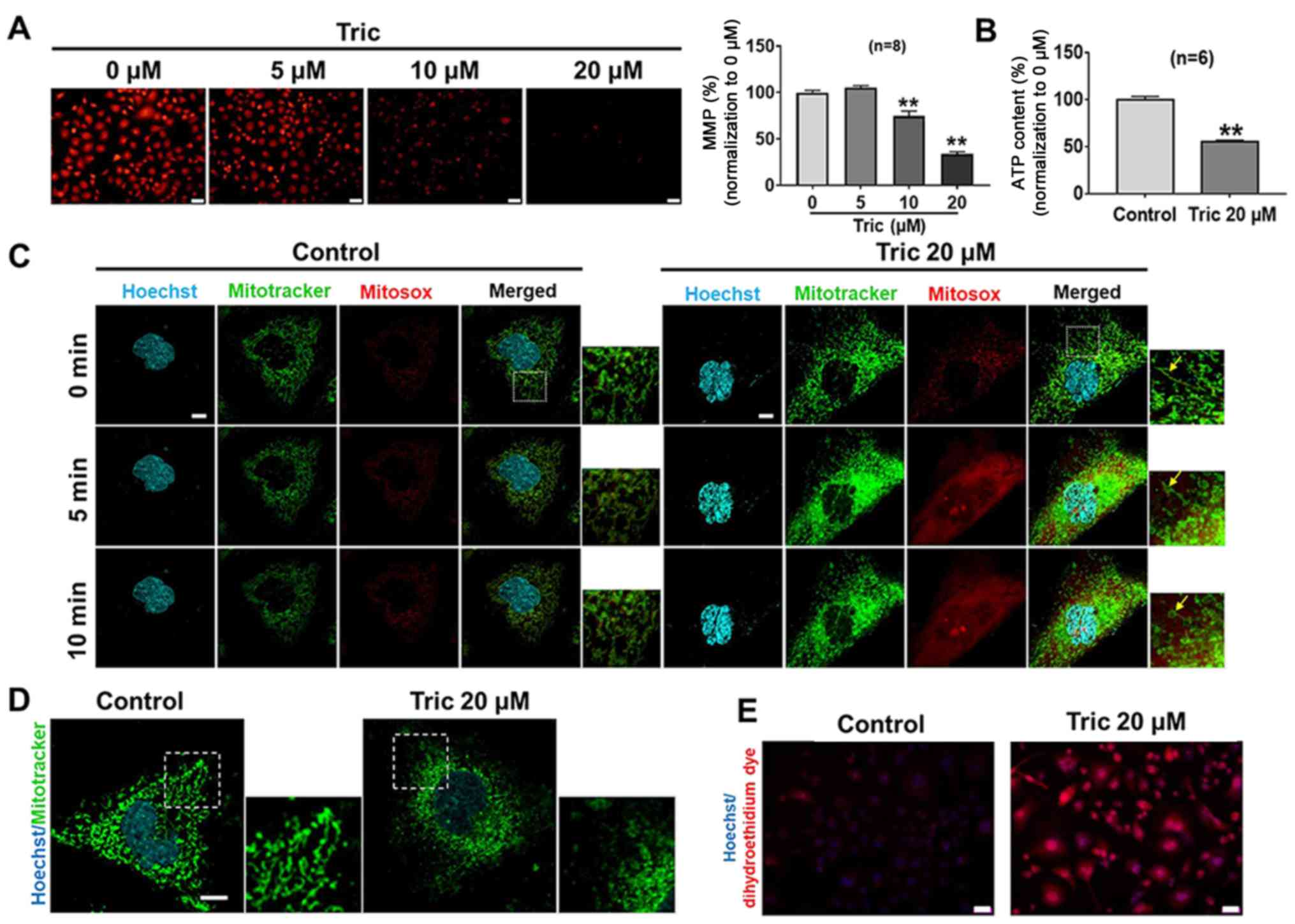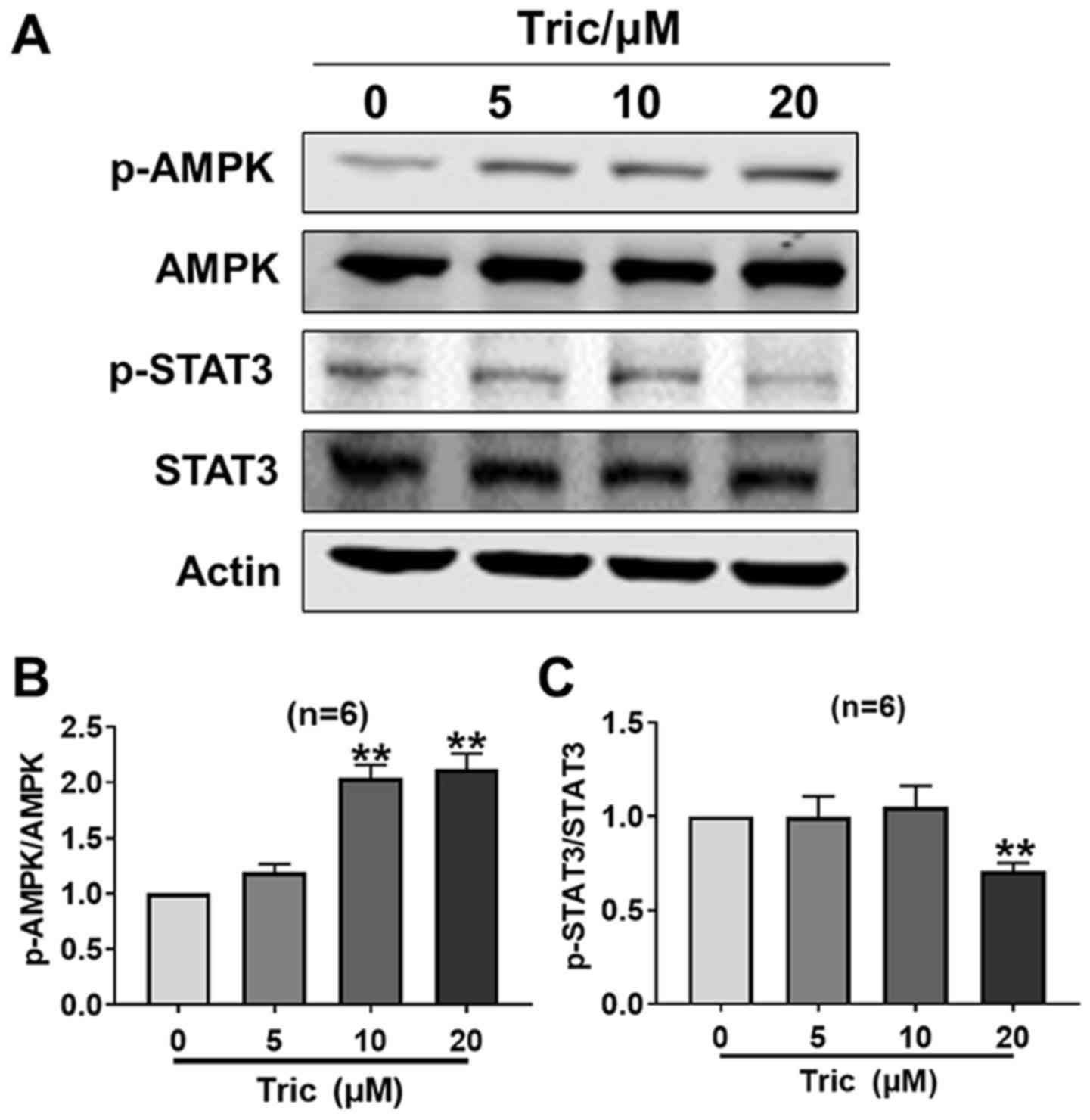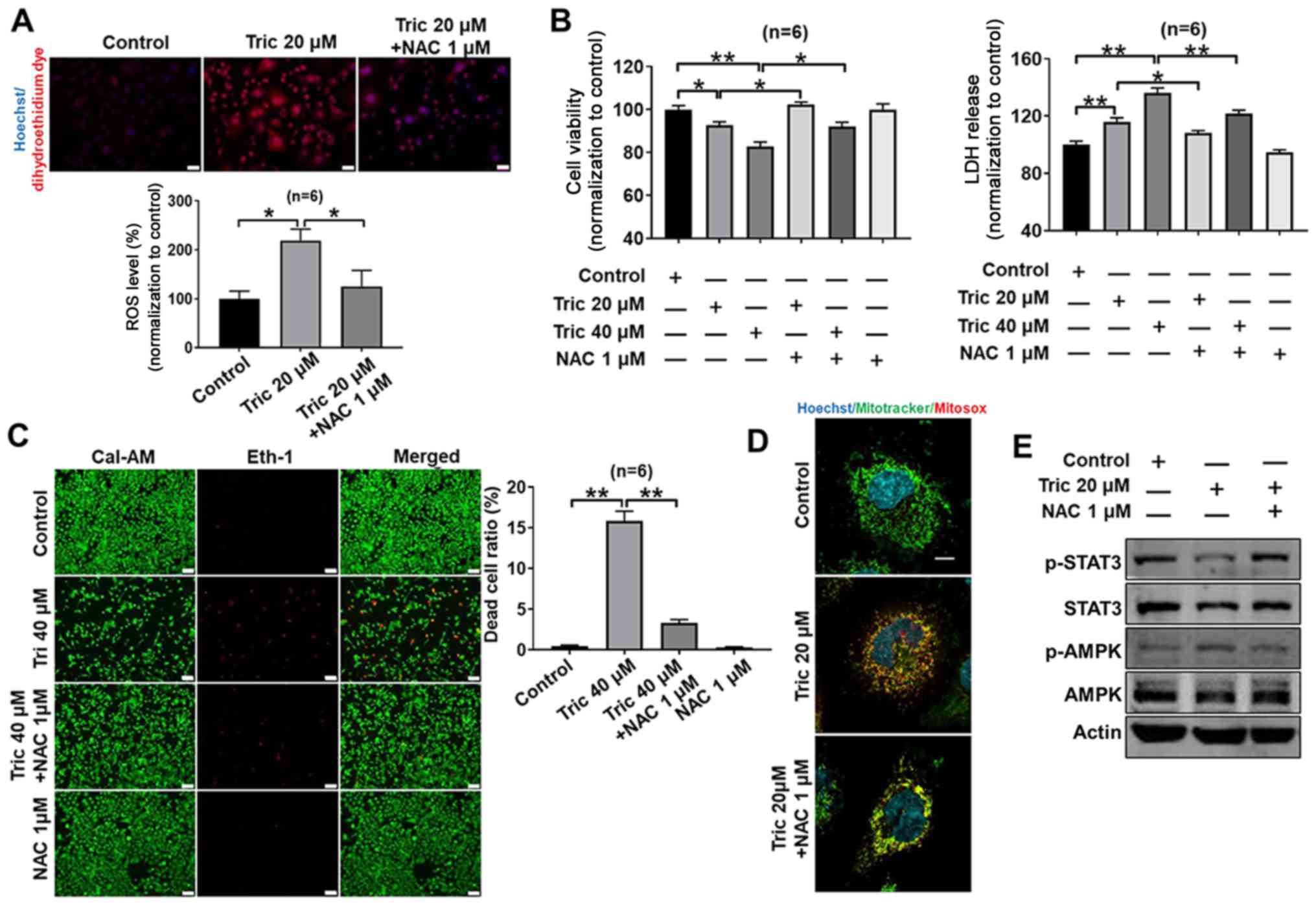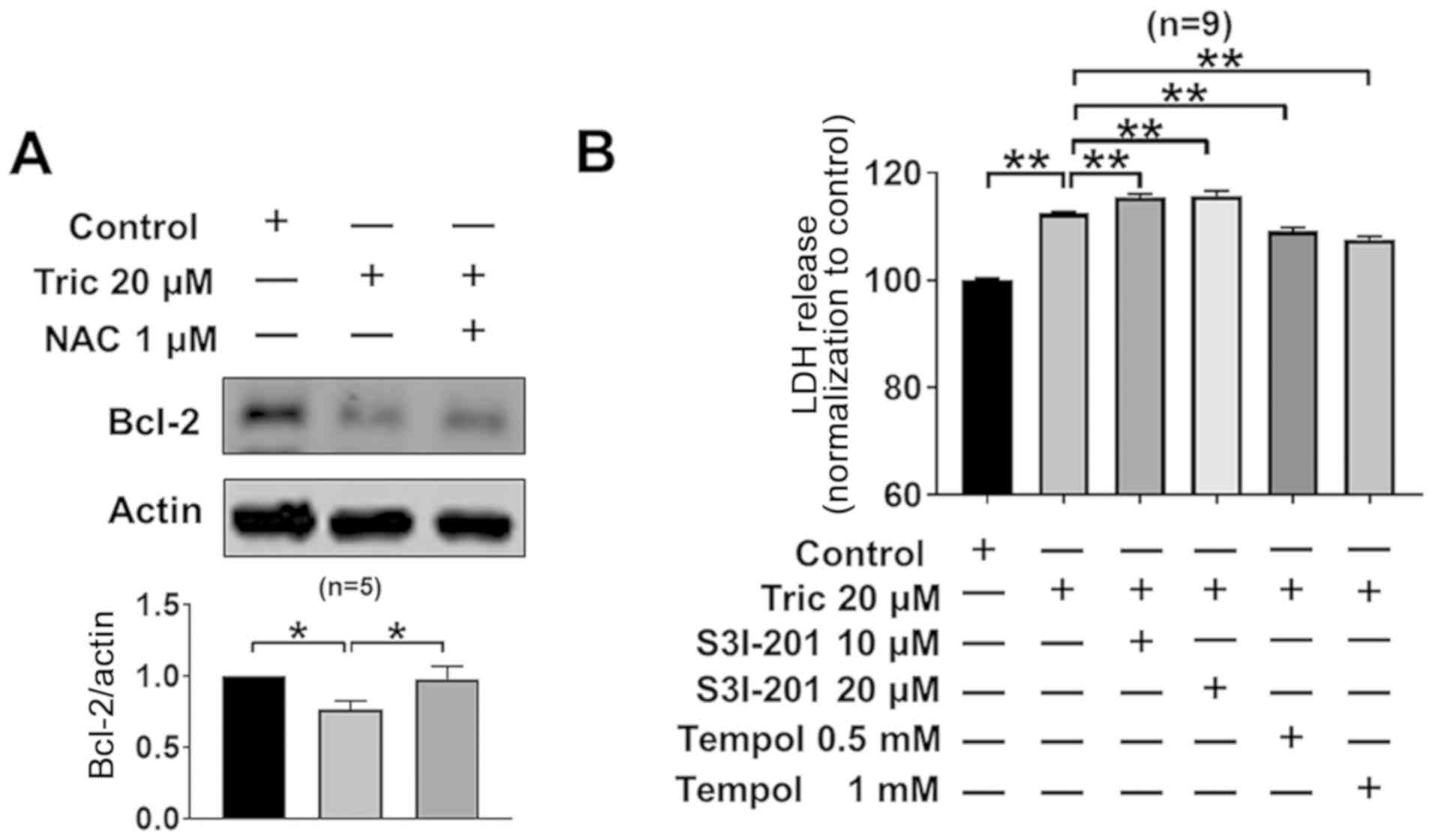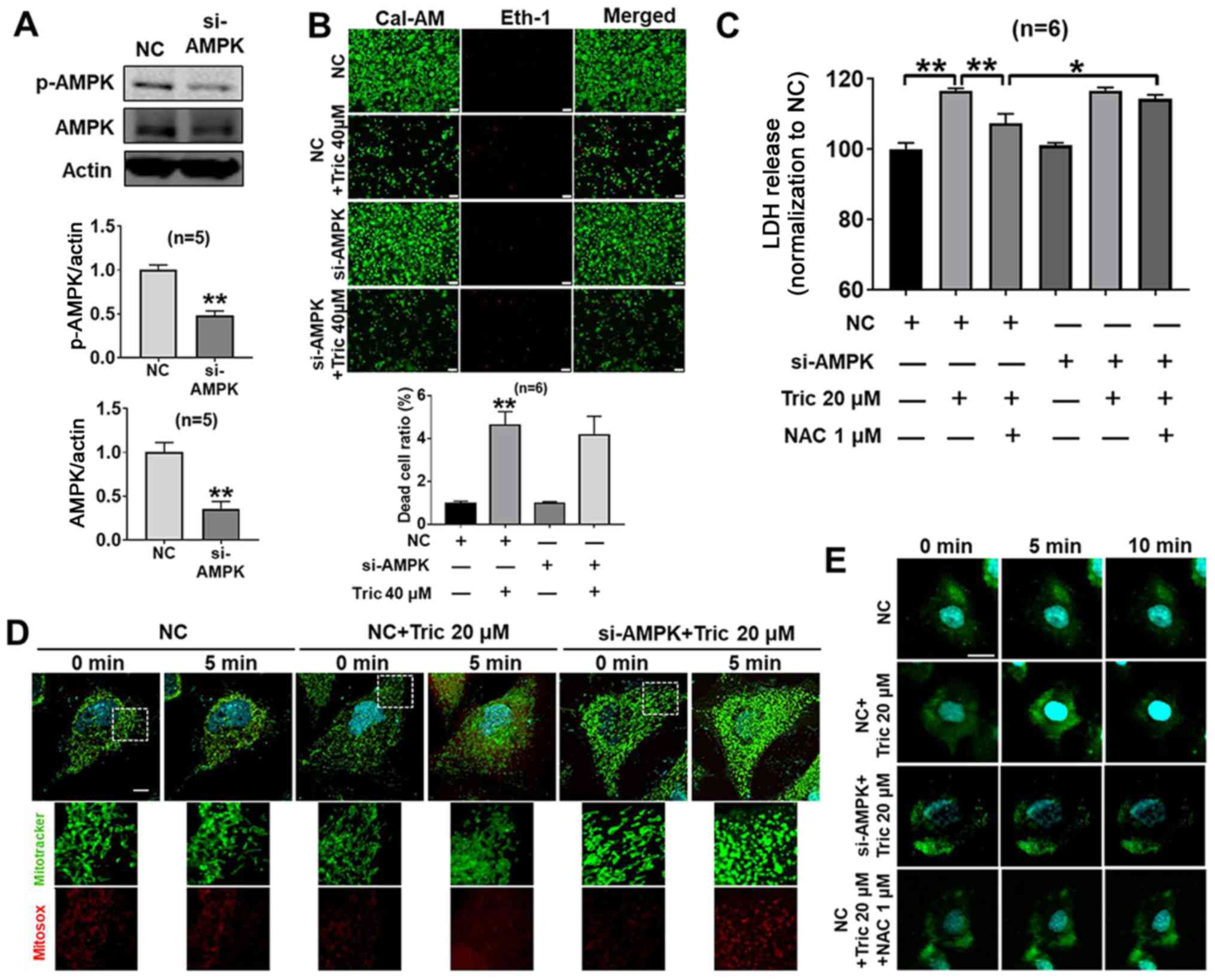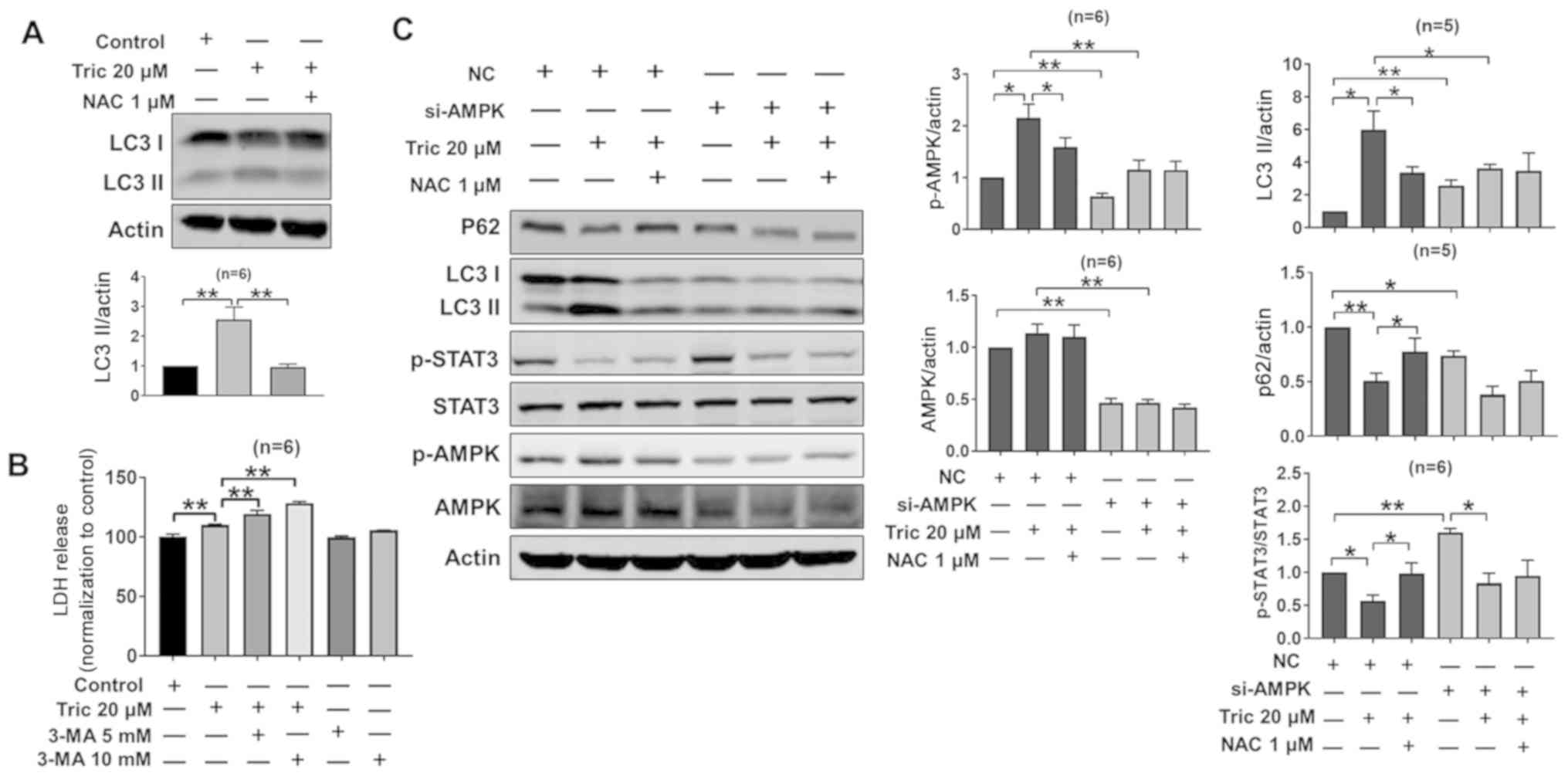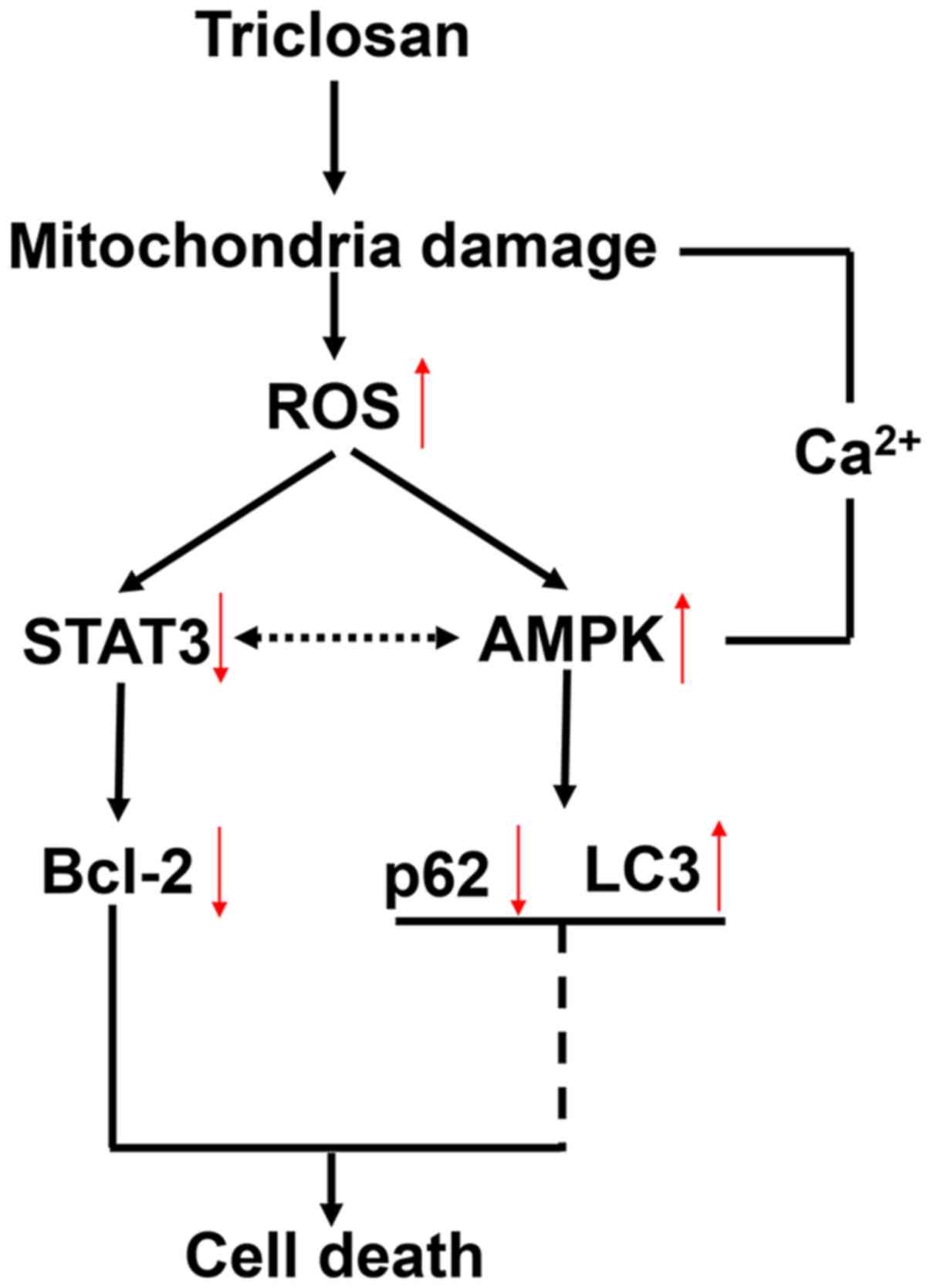|
1
|
Torre LA, Bray F, Siegel RL, Ferlay J,
Lortet-Tieulent J and Jemal A: Global cancer statistics, 2012. CA
Cancer J Clin. 65:87–108. 2015. View Article : Google Scholar : PubMed/NCBI
|
|
2
|
Miller KD, Siegel RL, Lin CC, Mariotto AB,
Kramer JL, Rowland JH, Stein KD, Alteri R and Jemal A: Cancer
treatment and survivorship statistics, 2016. CA Cancer J Clin.
66:271–289. 2016. View Article : Google Scholar : PubMed/NCBI
|
|
3
|
Abbas Q, Raza H, Hassan M, Phull AR, Kim
SJ and Seo SY: Acetazolamide inhibits the level of tyrosinase and
melanin: An enzyme kinetic, in vitro, in vivo, and in silico
studies. Chem Biodivers. 14:2017. View Article : Google Scholar
|
|
4
|
Lee CW, Yen FL, Ko HH, Li SY, Chiang YC,
Lee MH, Tsai MH and Hsu LF: Cudraflavone C induces apoptosis of
A375.S2 melanoma cells through mitochondrial ROS production and
MAPK activation. Int J Mol Sci. 18:15082017. View Article : Google Scholar
|
|
5
|
Trunzer K, Pavlick AC, Schuchter L,
Gonzalez R, McArthur GA, Hutson TE, Moschos SJ, Flaherty KT, Kim
KB, Weber JS, et al: Pharmacodynamic effects and mechanisms of
resistance to vemurafenib in patients with metastatic melanoma. J
Clin Oncol. 31:1767–1774. 2013. View Article : Google Scholar : PubMed/NCBI
|
|
6
|
Tuong W, Cheng LS and Armstrong AW:
Melanoma: Epidemiology, diagnosis, treatment, and outcomes.
Dermatol Clin. 30113–124. (ix)2012. View Article : Google Scholar : PubMed/NCBI
|
|
7
|
Eggermont AM, Spatz A and Robert C:
Cutaneous melanoma. Lancet. 383:816–827. 2014. View Article : Google Scholar : PubMed/NCBI
|
|
8
|
Nowinski SM, Solmonson A, Rundhaug JE, Rho
O, Cho J, Lago CU, Riley CL, Lee S, Kohno S, Dao CK, et al:
Mitochondrial uncoupling links lipid catabolism to Akt inhibition
and resistance to tumorigenesis. Nat Commun. 6:81372015. View Article : Google Scholar : PubMed/NCBI
|
|
9
|
Samudio I, Fiegl M and Andreeff M:
Mitochondrial uncoupling and the Warburg effect: Molecular basis
for the reprogramming of cancer cell metabolism. Cancer Res.
69:2163–2166. 2009. View Article : Google Scholar : PubMed/NCBI
|
|
10
|
Baffy G, Derdak Z and Robson SC:
Mitochondrial recoupling: A novel therapeutic strategy for cancer?
Br J Cancer. 105:469–474. 2011. View Article : Google Scholar : PubMed/NCBI
|
|
11
|
Weatherly LM and Gosse JA: Triclosan
exposure, transformation, and human health effects. J Toxicol
Environ Health B Crit Rev. 20:447–469. 2017. View Article : Google Scholar : PubMed/NCBI
|
|
12
|
Ribado JV, Ley C, Haggerty TD, Tkachenko
E, Bhatt AS and Parsonnet J: Household triclosan and triclocarban
effects on the infant and maternal microbiome. EMBO Mol Med.
9:1732–1741. 2017. View Article : Google Scholar : PubMed/NCBI
|
|
13
|
Weatherly LM, Shim J, Hashmi HN, Kennedy
RH, Hess ST and Gosse JA: Antimicrobial agent triclosan is a proton
ionophore uncoupler of mitochondria in living rat and human mast
cells and in primary human keratinocytes. J Appl Toxicol.
36:777–789. 2016. View
Article : Google Scholar : PubMed/NCBI
|
|
14
|
Campbell L and Zirwas MJ: Triclosan.
Dermatitis. 17:204–207. 2006. View Article : Google Scholar : PubMed/NCBI
|
|
15
|
Moretro T, Hoiby-Pettersen GS, Habimana O,
Heir E and Langsrud S: Assessment of the antibacterial activity of
a triclosan-containing cutting board. Int J Food Microbiol.
146:157–162. 2011. View Article : Google Scholar : PubMed/NCBI
|
|
16
|
Wu HX, Tan L, Tang ZW, Yang MY, Xiao JY,
Liu CJ and Zhuo RX: Highly efficient antibacterial surface grafted
with a triclosan-decorated poly(N-hydroxyethylacrylamide) brush.
ACS Appl Mater Interfaces. 7:7008–7015. 2015. View Article : Google Scholar : PubMed/NCBI
|
|
17
|
Maycotte P, Marin-Hernandez A,
Goyri-Aguirre M, Anaya-Ruiz M, Reyes-Leyva J and Cortes-Hernandez
P: Mitochondrial dynamics and cancer. Tumour Biol.
39:10104283176983912017. View Article : Google Scholar : PubMed/NCBI
|
|
18
|
Senft D and Ronai ZA: Regulators of
mitochondrial dynamics in cancer. Curr Opin Cell Biol. 39:43–52.
2016. View Article : Google Scholar : PubMed/NCBI
|
|
19
|
Phull AR, Nasir B, Haq IU and Kim SJ:
Oxidative stress, consequences and ROS mediated cellular signaling
in rheumatoid arthritis. Chem Biol Interact. 281:121–136. 2018.
View Article : Google Scholar : PubMed/NCBI
|
|
20
|
Lew M: Good statistical practice in
pharmacology. Problem 2. Br J Pharmacol. 152:299–303. 2007.
View Article : Google Scholar : PubMed/NCBI
|
|
21
|
Weatherly LM, Nelson AJ, Shim J, Riitano
AM, Gerson ED, Hart AJ, de Juan-Sanz J, Ryan TA, Sher R, Hess ST
and Gosse JA: Antimicrobial agent triclosan disrupts mitochondrial
structure, revealed by super-resolution microscopy, and inhibits
mast cell signaling via calcium modulation. Toxicol Appl Pharmacol.
349:39–54. 2018. View Article : Google Scholar : PubMed/NCBI
|
|
22
|
Park JY, Jang SY, Shin YK, Koh H, Suh DJ,
Shinji T, Araki T and Park HT: Mitochondrial swelling and
microtubule depolymerization are associated with energy depletion
in axon degeneration. Neuroscience. 238:258–269. 2013. View Article : Google Scholar : PubMed/NCBI
|
|
23
|
Liu MY, Jin J, Li SL, Yan J, Zhen CL, Gao
JL, Zhang YH, Zhang YQ, Shen X, Zhang LS, et al: Mitochondrial
fission of smooth muscle cells is involved in artery constriction.
Hypertension. 68:1245–1254. 2016. View Article : Google Scholar : PubMed/NCBI
|
|
24
|
Yan Y, Zhou XE, Xu HE and Melcher K:
Structure and physiological regulation of AMPK. Int J Mol Sci.
19:35342018. View Article : Google Scholar
|
|
25
|
Vasamsetti SB, Karnewar S, Kanugula AK,
Thatipalli AR, Kumar JM and Kotamraju S: Metformin inhibits
monocyte-to-macrophage differentiation via AMPK-mediated inhibition
of STAT3 activation: Potential role in atherosclerosis. Diabetes.
64:2028–2041. 2015. View Article : Google Scholar : PubMed/NCBI
|
|
26
|
Wang M, Xin H, Tang W, Li Y, Zhang Z, Fan
L, Miao L, Tan B, Wang X and Zhu YZ: AMPK serves as a therapeutic
target against anemia of inflammation. Antioxid Redox Signal.
27:251–268. 2017. View Article : Google Scholar : PubMed/NCBI
|
|
27
|
Xu Z, Zhang F, Bai C, Yao C, Zhong H, Zou
C and Chen X: Sophoridine induces apoptosis and S phase arrest via
ROS-dependent JNK and ERK activation in human pancreatic cancer
cells. J Exp Clin Cancer Res. 36:1242017. View Article : Google Scholar : PubMed/NCBI
|
|
28
|
Chen W, Zou P, Zhao Z, Chen X, Fan X,
Vinothkumar R, Cui R, Wu F, Zhang Q, Liang G and Ji J: Synergistic
antitumor activity of rapamycin and EF24 via increasing ROS for the
treatment of gastric cancer. Redox Biol. 10:78–89. 2016. View Article : Google Scholar : PubMed/NCBI
|
|
29
|
Chen X, Dai X, Zou P, Chen W, Rajamanickam
V, Feng C, Zhuge W, Qiu C, Ye Q, Zhang X and Liang G: Curcuminoid
EF24 enhances the anti-tumour activity of Akt inhibitor MK-2206
through ROS-mediated endoplasmic reticulum stress and mitochondrial
dysfunction in gastric cancer. Br J Pharmacol. 174:1131–1146. 2017.
View Article : Google Scholar : PubMed/NCBI
|
|
30
|
Rabinovitch RC, Samborska B, Faubert B, Ma
EH, Gravel SP, Andrzejewski S, Raissi TC, Pause A, St-Pierre J and
Jones RG: AMPK maintains cellular metabolic homeostasis through
regulation of mitochondrial reactive oxygen species. Cell Rep.
21:1–9. 2017. View Article : Google Scholar : PubMed/NCBI
|
|
31
|
Chen W, Li P, Liu Y, Yang Y, Ye X, Zhang F
and Huang H: Isoalantolactone induces apoptosis through
ROS-mediated ER stress and inhibition of STAT3 in prostate cancer
cells. J Exp Clin Cancer Res. 37:3092018. View Article : Google Scholar : PubMed/NCBI
|
|
32
|
Kryczek I, Lin Y, Nagarsheth N, Peng D,
Zhao L, Zhao E, Vatan L, Szeliga W, Dou Y, Owens S, et al:
IL-22(+)CD4(+) T cells promote colorectal cancer stemness via STAT3
transcription factor activation and induction of the
methyltransferase DOT1L. Immunity. 40:772–784. 2014. View Article : Google Scholar : PubMed/NCBI
|
|
33
|
Chai EZ, Shanmugam MK, Arfuso F,
Dharmarajan A, Wang C, Kumar AP, Samy RP, Lim LH, Wang L, Goh BC,
et al: Targeting transcription factor STAT3 for cancer prevention
and therapy. Pharmacol Ther. 162:86–97. 2016. View Article : Google Scholar : PubMed/NCBI
|
|
34
|
Min K, Lawan A and Bennett AM: Loss of
MKP-5 promotes myofiber survival by activating STAT3/Bcl-2
signaling during regenerative myogenesis. Skelet Muscle. 7:212017.
View Article : Google Scholar : PubMed/NCBI
|
|
35
|
Ye S, Xu P, Huang M, Chen X, Zeng S, Wang
Q, Chen J, Li K, Gao W, Liu R, et al: The heterocyclic compound
Tempol inhibits the growth of cancer cells by interfering with
glutamine metabolism. Cell Death Dis. 11:3122020. View Article : Google Scholar : PubMed/NCBI
|
|
36
|
Lantier L, Fentz J, Mounier R, Leclerc J,
Treebak JT, Pehmoller C, Sanz N, Sakakibara I, Saint-Amand E,
Rimbaud S, et al: AMPK controls exercise endurance, mitochondrial
oxidative capacity, and skeletal muscle integrity. FASEB J.
28:3211–3224. 2014. View Article : Google Scholar : PubMed/NCBI
|
|
37
|
Toyama EQ, Herzig S, Courchet J, Lewis TL
Jr, Loson OC, Hellberg K, Young NP, Chen H, Polleux F, Chan DC and
Shaw RJ: Metabolism. AMP-activated protein kinase mediates
mitochondrial fission in response to energy stress. Science.
351:275–281. 2016. View Article : Google Scholar : PubMed/NCBI
|
|
38
|
Vlachaki Walker JM, Robb JL, Cruz AM,
Malhi A, Weightman Potter PG, Ashford MLJ, McCrimmon RJ, Ellacott
KLJ and Beall C: AMP-activated protein kinase (AMPK) activator
A-769662 increases intracellular calcium and ATP release from
astrocytes in an AMPK-independent manner. Diabetes Obes Metab.
19:997–1005. 2017. View Article : Google Scholar : PubMed/NCBI
|
|
39
|
Javadov S, Chapa-Dubocq X and Makarov V:
Different approaches to modeling analysis of mitochondrial
swelling. Mitochondrion. 38:58–70. 2018. View Article : Google Scholar : PubMed/NCBI
|
|
40
|
Abe T, Takagi N, Nakano M, Tanonaka K and
Takeo S: The effects of monobromobimane on calcium and
phenylarsineoxide-induced mitochondrial swelling and cytochrome C
release in isolated brain mitochondria. Biol Pharm Bull.
27:524–527. 2004. View Article : Google Scholar : PubMed/NCBI
|
|
41
|
Teplova VV, Belosludtsev KN and Kruglov
AG: Mechanism of triclosan toxicity: Mitochondrial dysfunction
including complex II inhibition, superoxide release and uncoupling
of oxidative phosphorylation. Toxicol Lett. 275:108–117. 2017.
View Article : Google Scholar : PubMed/NCBI
|
|
42
|
Dite TA, Ling NXY, Scott JW, Hoque A,
Galic S, Parker BL, Ngoei KRW, Langendorf CG, O'Brien MT, Kundu M,
et al: The autophagy initiator ULK1 sensitizes AMPK to allosteric
drugs. Nat Commun. 8:5712017. View Article : Google Scholar : PubMed/NCBI
|
|
43
|
Bujak AL, Crane JD, Lally JS, Ford RJ,
Kang SJ, Rebalka IA, Green AE, Kemp BE, Hawke TJ, Schertzer JD and
Steinberg GR: AMPK activation of muscle autophagy prevents
fasting-induced hypoglycemia and myopathy during aging. Cell Metab.
21:883–890. 2015. View Article : Google Scholar : PubMed/NCBI
|
|
44
|
Sun L, Hu L, Cogdell D, Lu L, Gao C, Tian
W, Zhang Z, Kang Y, Fleming JB and Zhang W: MIR506 induces
autophagy-related cell death in pancreatic cancer cells by
targeting the STAT3 pathway. Autophagy. 13:703–714. 2017.
View Article : Google Scholar : PubMed/NCBI
|
|
45
|
Sutton MN, Yang H, Huang GY, Fu C,
Pontikos M, Wang Y, Mao W, Pang L, Yang M, Liu J, et al:
RAS-related GTPases DIRAS1 and DIRAS2 induce autophagic cancer cell
death and are required for autophagy in murine ovarian cancer
cells. Autophagy. 14:637–653. 2018. View Article : Google Scholar : PubMed/NCBI
|
|
46
|
Bolisetty S and Jaimes EA: Mitochondria
and reactive oxygen species: Physiology and pathophysiology. Int J
Mol Sci. 14:6306–6344. 2013. View Article : Google Scholar : PubMed/NCBI
|
|
47
|
Luo Z, Zang M and Guo W: AMPK as a
metabolic tumor suppressor: Control of metabolism and cell growth.
Future Oncol. 6:457–470. 2010. View Article : Google Scholar : PubMed/NCBI
|
|
48
|
Ke R, Xu Q, Li C, Luo L and Huang D:
Mechanisms of AMPK in the maintenance of ATP balance during energy
metabolism. Cell Biol Int. 42:384–392. 2018. View Article : Google Scholar : PubMed/NCBI
|
|
49
|
Yang YF, Wang YY, Hsiao M, Lo S, Chang YC,
Jan YH, Lai TC, Lee YC, Hsieh YC and Yuan SF: IMPAD1 functions as
mitochondrial electron transport inhibitor that prevents ROS
production and promotes lung cancer metastasis through the
AMPK-Notch1-HEY1 pathway. Cancer Lett. 485:27–37. 2020. View Article : Google Scholar : PubMed/NCBI
|
|
50
|
Mizushima N, Levine B, Cuervo AM and
Klionsky DJ: Autophagy fights disease through cellular
self-digestion. Nature. 451:1069–1075. 2008. View Article : Google Scholar : PubMed/NCBI
|
|
51
|
Lu L, Shen X, Tao B, Lin C, Li K, Luo Z
and Cai K: The nanoparticle-facilitated autophagy inhibition of
cancer stem cells for improved chemotherapeutic effects on
glioblastomas. J Mater Chem B. 7:2054–2062. 2019. View Article : Google Scholar : PubMed/NCBI
|
|
52
|
Wang RX, Xu XE, Huang L, Chen S and Shao
ZM: eEF2 kinase mediated autophagy as a potential therapeutic
target for paclitaxel-resistant triple-negative breast cancer. Ann
Transl Med. 7:7832019. View Article : Google Scholar : PubMed/NCBI
|
|
53
|
Ge A, Wang S, Miao B and Yan M: Effects of
metformin on the expression of AMPK and STAT3 in the spinal dorsal
horn of rats with neuropathic pain. Mol Med Rep. 17:5229–5237.
2018.PubMed/NCBI
|
|
54
|
Li H, Lee J, He C, Zou MH and Xie Z:
Suppression of the mTORC1/STAT3/Notch1 pathway by activated AMPK
prevents hepatic insulin resistance induced by excess amino acids.
Am J Physiol Endocrinol Metab. 306:E197–E209. 2014. View Article : Google Scholar : PubMed/NCBI
|
|
55
|
Gao JL, Zhao J, Zhu HB, Peng X, Zhu JX, Ma
MH, Fu Y, Hu N, Tai Y, Xuan XC and Dong DL: Characterizations of
mitochondrial uncoupling induced by chemical mitochondrial
uncouplers in cardiomyocytes. Free Radic Biol Med. 124:288–298.
2018. View Article : Google Scholar : PubMed/NCBI
|
|
56
|
Zhang W, Xia D, Li Z, Zhou T, Chen T, Wu
Z, Zhou W, Li Z, Li L and Xu J: Aurora-A/ERK1/2/mTOR axis promotes
tumor progression in triple-negative breast cancer and
dual-targeting Aurora-A/mTOR shows synthetic lethality. Cell Death
Dis. 10:6062019. View Article : Google Scholar : PubMed/NCBI
|















